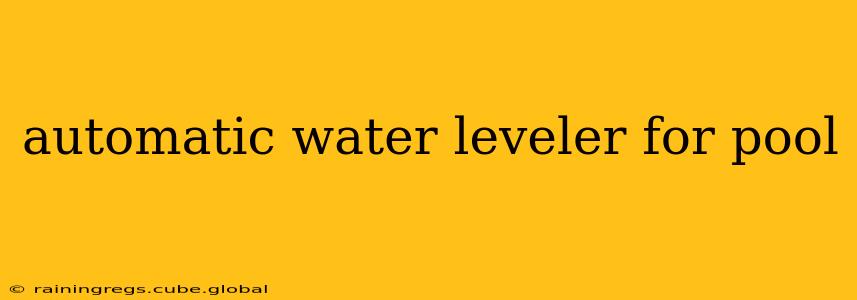Maintaining a swimming pool can be a significant undertaking, demanding consistent attention to various factors. One crucial aspect often overlooked is water level maintenance. Fluctuations due to evaporation, splashing, and backwashing can lead to inconsistent water levels, impacting the efficiency of your pool equipment and potentially damaging the pool structure itself. This is where an automatic pool water leveler comes in, offering a convenient and efficient solution for maintaining the perfect water level in your pool. This comprehensive guide explores the benefits, types, and considerations involved in choosing and installing an automatic water leveler for your swimming pool.
What is an Automatic Pool Water Leveler?
An automatic pool water leveler is a device designed to automatically replenish water lost from your pool due to evaporation, splashing, or backwashing. These systems typically consist of a sensor that monitors the water level, a control unit, and a water source connection. When the water level drops below a pre-set point, the system automatically activates, adding water from a designated source, such as a garden hose or a dedicated water line. This eliminates the need for manual topping-off, saving you time and effort.
How Does an Automatic Pool Water Leveler Work?
The operation is relatively straightforward:
- Level Sensing: A float switch, pressure sensor, or ultrasonic sensor monitors the water level in your pool.
- Level Monitoring: The sensor continuously monitors the water level and sends data to the control unit.
- Automatic Refilling: When the water level falls below the pre-set minimum, the control unit activates a valve, allowing water to flow into the pool from the designated source.
- Level Maintenance: The system continues to monitor and replenish water until the desired level is reached, ensuring consistent water levels.
- Shutoff: Once the pre-set maximum water level is reached, the system automatically shuts off, preventing overfilling.
Different Types of Automatic Pool Water Levelers
Several types of automatic pool water levelers are available, each with its own advantages and disadvantages:
- Float Switch Systems: These are the most basic and affordable type, using a float that rises and falls with the water level to activate a switch. They are simple to install but can be prone to malfunction if the float gets stuck or damaged.
- Pressure Sensor Systems: These systems use a pressure sensor submerged in the pool to measure water level. They are more accurate than float switch systems and less susceptible to mechanical failures.
- Ultrasonic Sensor Systems: These are the most advanced type, using ultrasonic waves to measure the water level. They are highly accurate and don't require any physical contact with the water, making them less prone to damage.
What are the Benefits of Using an Automatic Pool Water Leveler?
Installing an automatic pool water leveler offers several key advantages:
- Convenience: Eliminates the need for constant manual monitoring and topping-off of the pool.
- Water Conservation: Prevents overfilling and minimizes water waste.
- Protection of Pool Equipment: Maintains consistent water levels, ensuring optimal performance of your pool pump, filter, and other equipment.
- Cost Savings: Reduces the time and effort spent on pool maintenance.
- Extended Pool Life: Prevents damage to the pool structure caused by fluctuating water levels.
How Much Does an Automatic Pool Water Leveler Cost?
The cost of an automatic pool water leveler varies depending on the type, features, and brand. Expect to pay anywhere from a few hundred to several thousand dollars. The price usually reflects the sophistication of the technology used and any additional features included.
What are the Factors to Consider When Choosing an Automatic Pool Water Leveler?
Several factors should be taken into account when selecting an automatic pool water leveler:
- Pool Size and Type: The size and type of your pool will influence the type of system you need.
- Water Source: Consider the availability and pressure of your water source.
- Budget: Set a realistic budget before you start shopping.
- Ease of Installation: Choose a system that is relatively easy to install or consider hiring a professional.
- Maintenance Requirements: Consider the ongoing maintenance requirements of the system.
How to Install an Automatic Pool Water Leveler?
While some systems are relatively simple to install, others may require professional expertise, particularly those involving plumbing connections to a dedicated water line. Always consult the manufacturer's instructions and consider hiring a qualified pool professional if you are unsure about any aspect of the installation process. Improper installation could lead to malfunction or damage to your pool and equipment.
Can I Install an Automatic Pool Water Leveler Myself?
The feasibility of DIY installation depends heavily on your technical skills and the complexity of the chosen system. Simpler float switch systems are often easier to install than pressure or ultrasonic sensor systems which may require more advanced plumbing knowledge. Always prioritize safety and consult professional help if uncertain.
What are the common problems with automatic pool water levelers?
Common problems can include malfunctioning sensors, clogged valves, or leaks in the plumbing connections. Regular maintenance, including cleaning the sensor and checking for leaks, can help prevent these issues.
This guide provides a comprehensive overview of automatic pool water levelers. Remember to research thoroughly, consider your individual needs, and choose the system that best suits your pool and budget. By investing in an automatic pool water leveler, you can simplify pool maintenance and ensure your swimming pool remains a relaxing and enjoyable oasis for years to come.
